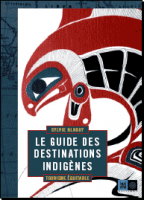New Faculty Profile - Sylvie Blangy
Carleton hosts Marie Curie Fellowship researcher in ecotourism
Nicole Findlay
Europeans and Canadians have much to learn from indigenous communities that preserve their traditional cultures while welcoming tourists eyeing a unique experience. Sylvie Blangy, of the Department of Geography and Environmental Studies, envisions a day when ecotourism models will serve as a source of inspiration, setting an example for land and cultural management practices. She refers to this as the "decolonialization".
"Aboriginal communities around the world are using ecotourism to rediscover their own culture, to finance schools and ecological restoration projects and preserve cultural and natural biodiversity," said Blangy.
Sylvie Blangy, a native of France, chose Carleton as a host for the Marie Curie Fellowship, because of the university’s reputation as a centre of excellence for its research in environmental studies and community development. Blangy’s primary contact with the department was Nancy Doubleday, who will act as her scientific advisor. For the next two years, Blangy will use the Fellowship funding to assist indigenous communities throughout Canada - including those in Cape Dorset, Nunavut, develop their strategies for sustainable, ethical tourism industries. In addition, the Fellowship is intended to create partnerships between Canadian and European researchers in this field.
For the past 15 years, Blangy has travelled the world, learning from and helping indigenous communities as they take the reins in developing their own economies through sustainable tourism. Early work in rural France established her as an ecotourism pioneer and would lead her to Eastern Europe, Africa and South America, where she facilitated the creation of a variety of ecotourism initiatives.
It was on a project in Guyana that an aboriginal colleague presented her with a new challenge. It wasn’t enough to assist in the creation of a sustainable travel industry, these had to be marketed as well. Blangy gathered her own notes capturing 50 such assignments, along with submissions describing 130 other projects, and created a travel book on indigenous tourism.
Akin to a French version of Lonely Planet, Le Guide des Destinations Indigenes combines the traditional booking information for accommodations and travel arrangements, with testimonials from each of the ecotourism communities and cultural descriptions suitable for both researchers and tourists alike.
Blangy envisions adding travel destinations throughout Canada to Aboriginal communities to future editions of her book.
FASS faculty members and post-doctorates can apply to become Marie Curie Fellows.
News Date : Feb. 2, 2007


